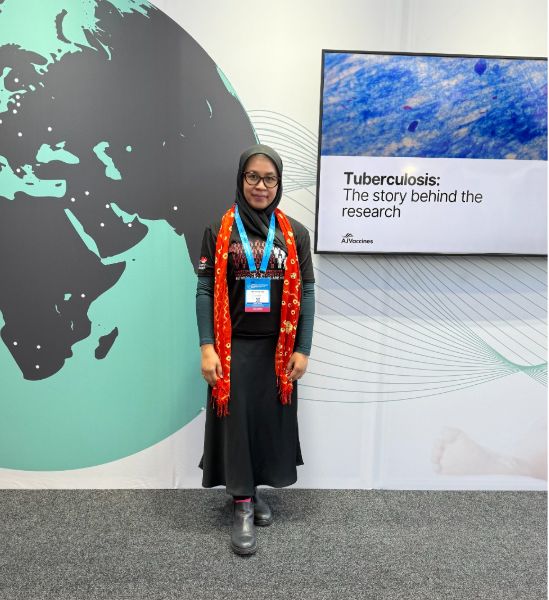At this year’s Union World Conference on Lung Health in Copenhagen, AJ Vaccines had the privilege of speaking with Ani Herna Sari – a two-time tuberculosis (TB) survivor, advocate and chairperson of Rekat Peduli Indonesia, who also works with The Global Fund.
Ani has lived through TB herself, including drug-resistant TB during her first pregnancy. In a personal reflection published by the Global Fund, she has described how years of misdiagnosis, isolation in hospital and separation from her newborn son shaped her understanding of what it means to be a TB patient.
When we met her in Copenhagen, she summarised the core of her work in one sentence:
“We make them realise that TB is preventable and curable.”
For Ani, that message is not only about clinical outcomes. It is about restoring hope, protecting dignity and making sure people feel safe enough to seek and complete treatment.

TB as both a medical and social challenge
According to the World Health Organization’s Global Tuberculosis Report 2024, an estimated 10.7 million people fell ill with TB in 2024 and around 1.23 million people died from the disease. These figures show the scale of the global TB burden, but they do not fully capture the social and emotional consequences of a diagnosis.
Through her work with patients and families in Indonesia, Ani sees how fear and stigma continue to shape people’s decisions. Some are uncertain where to go for help. Others are worried about being judged by neighbours, colleagues or even close relatives. Long and demanding treatment regimens can feel overwhelming, especially for those who already face economic insecurity or live far from health facilities. Side effects are often poorly understood, which makes it easier to give up when treatment becomes difficult.
Ani is clear that TB must be treated as the serious disease it is. At the same time, she underlines that shame and blame can be just as damaging as the infection itself if they prevent people from coming forward or staying in care.
Helping patients stay in treatment
Through Rekat Peduli Indonesia, Ani and her colleagues work to ensure that people with TB do not have to navigate this journey alone. Their focus is on helping patients enter treatment, understand what to expect and stay with it until completion.
Much of this work begins with simple, direct conversations. Ani and her team spend time in communities explaining that TB is both preventable and curable, and that seeking help is a sign of responsibility – not of failure. In some areas, they organise local activities with so-called “TB rangers”, who help raise awareness, encourage screening and act as familiar faces people can turn to with questions.
Role models are also important. By being open about her own experience, Ani shows that it is possible to recover from TB and rebuild one’s life. That visibility helps counter the idea that a TB diagnosis is the end of a person’s opportunities.
She also points to the importance of linking TB care with broader social protection. Even where insurance schemes exist, some patients still lack coverage or struggle to pay for transport and time away from work. In remote areas, distance to health facilities remains a major barrier. Initiatives such as portable X-rays or outreach clinics in rural communities can make a significant difference for people who would otherwise remain undiagnosed or drop out of treatment.
“Treatment is not only about medications”
Ani’s work does not stop at the community level. Through her advocacy with The Global Fund and other partners, she also engages with policymakers on the design and funding of TB services.
Her message is straightforward:
“I hope that policymakers understand that treatment is not only about medications. It's about dignity, equity, and ensuring that no one is left behind. With a strong political commitment, funding, and community involvement we can make significant progress towards ending TB.”
For Ani, this means stable and sufficient funding for TB programmes, including support for community-based initiatives that meet people where they are. It also means involving TB survivors and affected communities in decisions that shape services, rather than only consulting them once programmes are already designed. And it requires recognising that people living with TB need allies – in their families, in their local health systems and at institutional level – who will keep TB on the agenda and argue for long-term solutions.
Why voices like Ani’s matter
For AJ Vaccines, listening to advocates like Ani at the Union World Conference on Lung Health is a reminder that TB is never just a set of numbers, guidelines or protocols.
Her perspective underlines that effective TB responses must address both the clinical and the human dimensions of the disease. Delayed diagnosis and treatment are not only the result of limited resources, but also of fear, misinformation and a lack of trust. Dignity, equity and partnership are therefore not optional additions; they are essential if no one is to be left behind.
By bringing lived experience into discussions on TB, voices like Ani’s help ensure that policies and programmes are grounded in the realities of those most affected – and that the goal of ending TB remains connected to the people behind the statistics.
This interview was conducted at the Union World Conference on Lung Health 2025 in Copenhagen as part of our “Voices in the Fight Against TB” series, highlighting perspectives from advocates and experts working every day to end tuberculosis (TB).
(Interview by Trine Bastian, Head of Communications, AJ Vaccines)